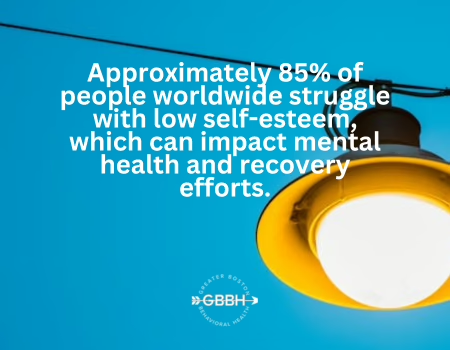Recovery from addiction or mental health challenges is a transformative journey that extends beyond addressing symptoms or breaking free from harmful habits. At its core, recovery is about rebuilding the foundation of self-worth and developing a positive self-image. This shift is crucial for maintaining sobriety, fostering emotional resilience, and leading a fulfilling life. However, achieving a positive self-image is often one of the most challenging aspects of recovery.
At Greater Boston Behavioral Health (GBBH), we prioritize self-image development as an essential part of recovery. Through programs like our Mental Health Program, Trauma Therapy Program, and Group Therapy Program, we help individuals cultivate self-worth and learn to see themselves in a healthier, more empowering light. In this detailed guide, we’ll explore why self-image matters in recovery, the barriers individuals face, and how to overcome them through evidence-based strategies and professional support.
Why Self-Image Matters in Recovery
Your self-image—how you perceive and value yourself—affects every aspect of your recovery journey. A positive self-image fosters resilience, motivation, and emotional stability, which are critical for overcoming challenges and avoiding relapse.
Key Benefits of a Positive Self-Image in Recovery
- Emotional Resilience:
- A strong sense of self-worth helps you navigate setbacks without falling into despair or self-blame.
- Motivation to Succeed:
- When you believe in your abilities, you’re more likely to set and achieve recovery goals.
- Improved Relationships:
- A healthy self-image allows you to build authentic connections and communicate effectively.
- Reduced Relapse Risk:
- A positive view of yourself acts as a protective factor against relapse by reducing feelings of shame, guilt, or hopelessness.
Common Barriers to Building a Positive Self-Image
Developing a positive self-image during recovery is not always straightforward. Many individuals struggle with deeply rooted negative beliefs about themselves due to past experiences, mental health conditions, or societal stigma.
1. Internalized Shame and Guilt
- Impact: Shame and guilt stemming from past actions, such as substance use or broken relationships, can lead to persistent feelings of unworthiness.
- Solution: Self-compassion, forgiveness, and programs like Family Therapy can help address these emotions constructively.
2. Low Self-Esteem from Mental Health Challenges
- Impact: Conditions like depression and anxiety often diminish self-confidence and amplify self-doubt.
- Solution: Therapy modalities like Cognitive Behavioral Therapy (CBT) can help reframe negative thoughts and rebuild confidence.
3. Trauma’s Role in Self-Perception
- Impact: Unresolved trauma can create feelings of helplessness or self-blame.
- Solution: Addressing these issues through a Trauma Therapy Program is essential for healing and self-acceptance.
4. Societal Stigma
- Impact: Judgment or misunderstanding from others can reinforce negative self-perceptions.
- Solution: Group therapy offers a safe space for individuals to share their experiences and find validation.
Steps to Rebuild a Positive Self-Image in Recovery
Cultivating a positive self-image is an ongoing process that involves self-awareness, intentional effort, and professional guidance. Below are actionable steps to support this journey:
1. Practice Self-Compassion
Self-compassion involves treating yourself with kindness and understanding, especially during moments of struggle. Recovery is a challenging process, and learning to accept imperfections is a vital part of building self-worth.
Practical Tips:
- Replace self-criticism with supportive affirmations. For example, instead of “I’ll never get better,” try “I’m working hard, and progress takes time.”
- Acknowledge your efforts, even if outcomes aren’t perfect.
- Reflect on challenges as opportunities for growth rather than failures.
2. Set and Celebrate Achievable Goals
Setting small, realistic goals gives you a sense of accomplishment and reinforces self-confidence. These goals can be related to recovery milestones, daily habits, or personal growth.
Examples:
- Attending therapy consistently.
- Completing a mindfulness exercise each day.
- Rebuilding trust with a loved one through open communication.
Celebrating these achievements, no matter how minor they seem, helps establish a cycle of positivity and progress.
3. Reframe Negative Thought Patterns
Negative thoughts like “I’m not good enough” or “I’ll always fail” can undermine self-image. Reframing these thoughts into positive, constructive ones is a powerful way to challenge self-doubt.
Techniques for Reframing:
- Identify and write down negative thoughts.
- Replace them with evidence-based counterarguments. For example, replace “I’m always failing” with “I’ve overcome challenges before, and I can do it again.”
- Practice this regularly to internalize positive thinking patterns.
At GBBH, CBT is a core component of our Mental Therapy Programs, providing individuals with tools to challenge and change negative thought patterns.
4. Focus on Strengths and Accomplishments
Shifting your focus from perceived shortcomings to personal strengths can transform how you view yourself.
How to Identify Strengths:
- Make a list of your positive qualities and skills, such as resilience, empathy, or problem-solving abilities.
- Reflect on past accomplishments, no matter how small.
- Seek feedback from trusted friends or therapists in Group Therapy Programs to uncover hidden strengths.
5. Surround Yourself with Positive Influences
The people you surround yourself with can have a significant impact on your self-image. Building a supportive network fosters encouragement, accountability, and a sense of belonging.
Tips for Building a Supportive Network:
- Participate in Group Therapy Programs to connect with peers who understand your journey.
- Reconnect with friends and family who uplift and support you.
- Distance yourself from toxic relationships or environments that reinforce negative self-perceptions.
6. Address Underlying Trauma
Trauma can deeply affect self-worth, often leading to feelings of unworthiness or self-blame. Processing these experiences through therapy is crucial for healing.
Trauma-Informed Practices:
- Explore therapies like Eye Movement Desensitization and Reprocessing (EMDR) or mindfulness-based approaches to address trauma’s impact on self-image.
- Work with a therapist in a Trauma Therapy Program to develop coping strategies and reframe negative beliefs.
7. Engage in Self-Care
Self-care is a tangible way to show yourself that you are deserving of love and attention. Simple acts of self-care can reinforce self-worth and improve overall well-being.
Self-Care Practices:
- Develop a consistent sleep routine to support mental and physical health.
- Incorporate physical activity, such as yoga or walking, to boost mood and energy levels.
- Spend time on hobbies or activities that bring joy and relaxation.
8. Seek Professional Support
Rebuilding self-image often requires guidance and tools provided by experienced professionals. Therapeutic programs tailored to your needs can accelerate this process.
Programs at GBBH Include:
- Intensive Outpatient Program (IOP): Flexible care for individuals balancing recovery with daily responsibilities.
- Partial Hospitalization Program (PHP): Comprehensive support for addressing self-image and emotional challenges.
- Anger Management Program: Teaching constructive ways to process and express emotions.
How Therapy Supports Positive Self-Image
Therapy is a cornerstone of recovery and self-image development. At GBBH, we offer evidence-based therapies tailored to individual needs, helping clients rebuild their confidence and embrace their worth.
Therapeutic Approaches at GBBH:
- CBT: Reshaping negative thought patterns to foster self-worth.
- Dialectical Behavior Therapy (DBT): Developing emotional regulation and interpersonal skills.
- Family Therapy Program: Rebuilding trust and strengthening relationships to support recovery.
- Trauma Therapy Program: Addressing the root causes of self-doubt and rebuilding resilience.
Why Choose Greater Boston Behavioral Health?
At Greater Boston Behavioral Health, we are dedicated to helping individuals cultivate a positive self-image and achieve lasting wellness. Our holistic approach addresses the unique challenges of recovery, ensuring that every individual receives the care and support they need.
Why Clients Trust Us:
- Comprehensive Care: From Mental Health Programs to Group Therapy Programs, we offer a wide range of services tailored to each individual.
- Experienced Team: Our therapists are experts in mental health and self-esteem development.
- Safe Environment: As a trusted Mental Health Treatment Center in Boston, we provide a compassionate space for healing.
Conclusion
Recovery is an opportunity to rediscover your worth and rebuild your life with confidence. At Greater Boston Behavioral Health, we’re here to guide and support you every step of the way.
Contact us today at (888)278-0716 to learn more about our services, including Trauma Therapy Programs, Group Therapy Programs, and Intensive Outpatient Programs. Together, we’ll help you cultivate self-worth and achieve lasting recovery.
FAQ Building a Positive Self-Image in Recovery
Why is a positive self-image important during recovery?
A positive self-image helps individuals build resilience, stay motivated, and maintain recovery. It reduces feelings of shame and guilt, fostering self-worth and emotional stability.
What are common barriers to developing a positive self-image in recovery?
Barriers include internalized shame, low self-esteem from mental health challenges, unresolved trauma, and societal stigma.
How can I improve my self-image during recovery?
Strategies include practicing self-compassion, setting achievable goals, reframing negative thoughts, addressing trauma through therapy, and surrounding yourself with supportive influences.
How does therapy help with self-image?
Therapies like Cognitive Behavioral Therapy (CBT), Dialectical Behavior Therapy (DBT), and Trauma Therapy Programs provide tools to address negative thought patterns, heal from trauma, and develop self-worth.
What services does Greater Boston Behavioral Health offer for self-image improvement?
GBBH provides a range of programs, including Mental Health Programs, Trauma Therapy Programs, Group Therapy Programs, and Family Therapy Programs, all tailored to support self-image and recovery.
Can family and group therapy help with self-image?
Yes, family and group therapy foster connection, reduce feelings of isolation, and provide encouragement from loved ones and peers.


